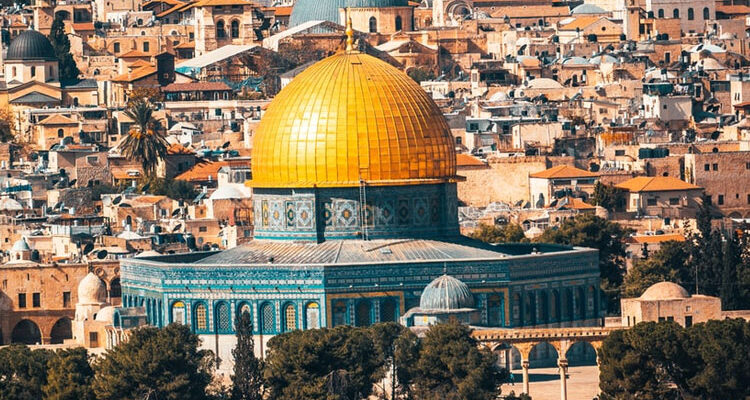Palestine
Palestine is a small country that has played a significant part in the mediaeval and modern Middle East history. The background of Palestine, as a result of its value to many other important world religions and because Palestine sits at a significant geopolitical transition point between Africa and Asia, was marked by frequent political disputes, violent land confiscation. Today, the Arab people that call this land home are known as Palestinians and in this challenged region of the world, the people of Palestine have a powerful willpower to establish a free and independent state.
The name ‘Palestine’ is thought by intellectuals to originate from “Philistia” referring in the 12th century B.C. to Philistines who invaded part of the area. Palestine has been ruled throughout history by numerous groups, such as the Assyrians, the Babylonians, the Persians, the Greeks, the Romans. The Ottoman Empire ruled the region from approximately 1517 to 1917. The British took over Palestine when the First World War ended in 1918. The League of Nations authorized a United Nations policy for Palestine, a manuscript that allowed Britain to manage this region administratively, and provided for clauses on the establishment in 1923 including its Jewish national homeland in Palestine.
In 1947, the UN submitted a proposal for dividing Palestine into two parts: an independent Jewish country and an independent Arab State. The town of Jerusalem, which both Jewish and Palestinian Arabs declared as a capital, was to be a particularly unique position international territory. The plan was approved by Jewish leaders, but there was strong opposition from many Palestinian Arabs, some of whom had actively been fighting for Jewish and British rights in the region since the 1920’s. Arab groups tried to argue that in many areas they displayed the majority of the population and that more territory was to be allowed. They started to form armies of volunteers across Palestine.
Israel
Israel is a comparatively tiny state in the Middle East, surrounded by Egypt, Jordan, Lebanon and Syria, on the eastern bank of the Mediterranean. There are several famous archaeological and sacred sites of Jews, Muslims and Christians alike. The Israelites, with over nine million people, mainly Jews, have a complicated history of periods of stress and clash. Much of the knowledge of the ancient history of Israel comes from the Hebrew Bible. The text states that the roots of Israel can be traced all the way back to Abraham, who is both considered to be the father of Judaism and Islam.
The children and grandchildren of Abraham, who are mostly the nation of modern-day Israel, were considered to be imprisoned by the Egyptians for hundreds of years before settling down at Canaan. Around 1000 B.C. King David governed the nation. The construction of the first holy temple in ancient Jerusalem is acclaimed for its son, who was made King Solomon. The region was broken down into two kingdoms in around 931 B.C.: Israel in the north and Judah in the south. Between 1517 and 1917 Israel was governed by the Ottoman Empire, along with most of the Middle East.
However, the geopolitical environment in the Middle East has dramatically changed during the First World War. British Foreign Secretary Arthur James Balfour presented, at the standout of the war, a letter of intended meaning to facilitate a Jewish homeland in Palestine in 1917. The British government hopefully encouraged support for the Allies during World War I by the formal declaration later known as the Balfour Declaration. The 400 year rule in the Ottoman Empire came to an abrupt end, and Britain came to rule on what was called Palestine in 1918, following the Allied victory. The Balfour Declaration was approved in 1922 by the League of Nations and the British mandate for Palestine. Arabs fiercely opposed the Balfour Declaration, claiming that the subordination of Arab Palestinians would signify a Jewish homeland. The British ruled Palestine until Israel became an independent country in 1947 in the years following the end of World War II.
Israel and Palestine Conflict
Background
The clash between Israel and Palestine goes all the way back to the end of the 19th century. The United Nations adopted in 1947 a Resolution 181, called the partition plan, which attempted to split the British Palestinian Mandate into Arab and Jewish states. The first Arab-Israeli War was initiated by the State of Israel on 14 May 1948. The war came to an end in 1949 with the victory of Israel, while 750,000 Palestinians were evacuated in three parts: the State of Israel, the West Bank and Gaza Strip.
Violence in the region, especially between Israel and Egypt, Jordan and Syria, have been growing within the next few years. In apprehension of Israel’s potential redeployment, following the Suez Crisis in 1956 and the Israel invasion of the Sinai Peninsula, Egypt, Jordan and Syria signed mutual defense pacts. In June 1967, Israel assaulted Egyptian and Syrian air forces spitefully, following a series of strategies by Egyptian President Abdel Gamal Nasser, starting the Six-Day War.
The Sinai Peninsula and Gaza Strip were controlled by Israel after the war through Egypt, the West Bank and East Jerusalem through Jordan, and Golan Highs through Syria. Six years later, Egypt and Syria initiated a surprises two-front strike on Israel in the so called Yom Kippur War or October War to recover their former territories; it was not a conflict that brought significant improvements for Egypt, Israel, and Syria, but Egyptian President Anwar al-Sadat proclaimed war a victory for Egypt, as he permitted Egypt and Syria to negotiate on previously-given terrible events. In 1979, the Camp David Agreement, a peace agreement that concluded the thirty-year dispute between Egypt and Israel, was finally signed by elected officials of Egypt and Israel following the wake of a series of ceasefires and peace negotiations.
Even though the Camp David Agreements enhanced connections between Israel and its neighboring countries, the issue of Palestinian autonomy and independence continued to persist. In 1987, the first intifada against the Israeli government was the rise of tens of billions of Palestinian people living on the West Bank and Gaza strip. The Oslo I Accords of 1993 moderated the dispute, formed the Palestinians in West Bank and Gaza as a framework for governance, and facilitated the recently founded Palestinian Authority to have mutual recognition of Israel.
In 1995 the first pact of the Oslo II Agreement was extended to incorporate provisions requiring Israel to be removed completely from 6 cities and 450 cities in the West Bank. The Palestinians launched a second intifada in 2000, which lasted until 2005, due partly to Palestinian complaints about Israel’s control of the West Bank, a stagnant peace process and former Israel Prime Minister Ariel Sharon’s visit to Islam’s al-Aqsa Mosque – Islam’s third most holy site. In 2002, despite objections from the International Court of Justice and the International Criminal Court, Israeli government authorized the creation of a barrier wall across the West Bank.
In 2013, the US managed to resurrect the Israeli government’s peace negotiations with the Palestinian Leadership in West Bank. The peace talks were interrupted, however, when in 2014 Fatah, the ruling party of the Palestinian Authority, established a unity regime with its rival Hamas faction. Hamas, one of the significant Palestinian political groups, was established in 1988 in the wake of the first Outbreak of violence and was assigned by the USA as an external terrorist organization in 1997. Summer 2014 was the year when conflicts in Palestinian territory sparked a conventional war between Hamas and Israel with nearly 3,000 bullets launched by the Hamas and a major inflammatory by Israel in Gaza. The riot managed to end by an Egyptian quitting deal in late August 2014, but only after the killing of 73 Israelis and 2.251 Palestinians. Palestinian President Mahmoud Abbas announced in 2015 the Palestinians are no longer tied by the regional divisions developed by the Oslo Accords following a wave of violence between Israelis and Palestinians.
Palestinians held weekly demonstrations in the Gaza Strip on the Gaza Strip’s borders with Israel in March-May 2018. The last protest corresponded with the seventy-year anniversary of the Nakba, the Palestinian migration accompanying the independence of Israel. Almost all of the protests were peaceful, however some hurling stones and other objects into the perimeter fence. 183 protesters were killed, over 6,000 injured in live ammunition, according to the United Nations. In May 2018 as well, Hamas and the Israeli military engaged in fighting during the worst history of conflict since 2014. In Gaza, militant groups fired over a hundred rockets into Israel before they reached a cessation of fire, and Israel responded in the twenty-four hour flares with strikes against over fifty targets.
Current state
Palestinian protesters and the police have compelled the major holy lands of Jews, Christians and Muslims in and around Jerusalem’s Old City, the empathy heart of the Middle East conflict, on a regular basis for weeks. For 100 years, Jerusalem has been the picture of violent struggles between Jews and Arabs and is still one of the most bitterly disputed cities of the world. The recent conflicts began a month ago with an Israeli attempt to remove some of the Palestinian meetings, which were already a time of increasing religious sensibilities in the early Muslim holy month of Ramadan. After these constraints had eased, there were further conflicts over a plan to evacuate dozens of Palestinians from the east of Jerusalem. Rackets cascaded out of Gaza most recently, and Israel struck the area on Wednesday with bombings, with dozens killed in sight, with no negotiated settlement on glance. According to the Ministry of Health, the number of deaths in Gaza increased to 43 Palestinians, amongst them 13 children and 3 women. Two historic Gaza Strip apartment buildings, in which 2 millions Palestinians lived, have been erected by Israeli air strikes.
The United Nations Office on the Coordination of Humanitarian Affairs has stated that Israel dismantled 848 Palestinian homes and living structures in the occupied West Bank, including East Jerusalem, with 996 displacements (OCHA). The Israeli authorities said most of the buildings destroyed had no Israeli licenses which Palestinians could hardly acquire, or which were in military confined spaces. Unless necessary for military operations, the Occupational Law prohibits such destruction. In other cases, Israel seized housing and living facilities, including some donated for humanitarian purposes.
Israeli troops used exaggerated forces in Kufr Qadum against protesters who proceeded to protest settlements and settlement expansions on a weekly basis. OCHA reports that over the course of the year, 214 protestors and supporters were wounded. On 15 February, Israel’s forces shot and injured Malek Issa, a 9 year old, as he returned from school in Issawiya, East Jerusalem. As per OCHA, there were no conflicts at the point. The Israeli forces maintained as a collective punishment a strong and abusive police operation in Issawija. Fishermen and farmers in Gaza were often fired by Israeli forces. The injuries went to 12 fishers and five peasant farmers.
On 2 February, Israel abruptly cancelled 500 Gaza trader’s licenses allowing their own holders to move freely to Israel and the West Bank for business following an interchange of attacks between the Israeli forces and Palestinian army. On 18 February, the permission was revived. Omar Yaghi, a cardiovascular kid, died in Gaza on June 18 when Israel refused the permission to enter Israel in the Sheba Medical Sanctuary in the city of Ramat Gan for a scheduled surgery on May 24. In the West Bank, at least 593 Israelis have continued to strongly restrict Palestinian movement and availability to rights, including health, education and employment. Israelis carried out dozens of invasions across the West Bank, generally within their own homes at night, to prosecute Palestinians. Those apprehended and hundreds of other OPT Palestinians arrested in earlier years were imprisoned in Israeli detention centers.. This upheld international humanitarian law prohibiting the transmission of prisoners into occupying power region.




